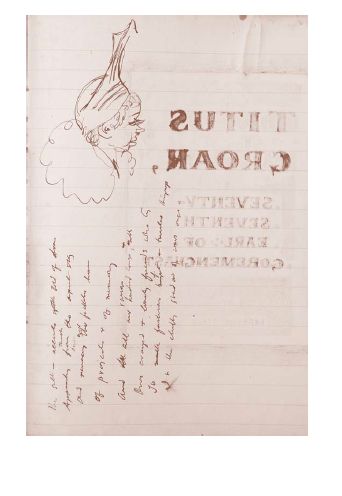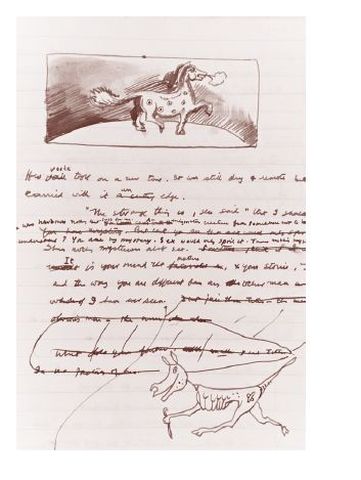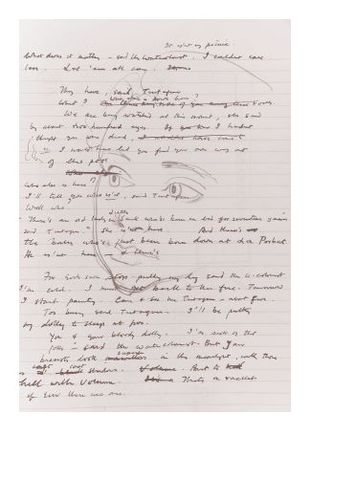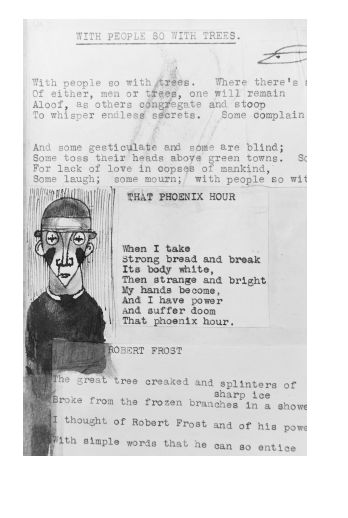Mervyn Peake : Archive Edition : Limited First Edition Works
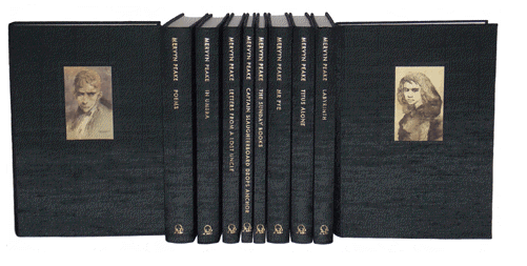
The works of Mervn Peake, limited editions in fine binding, including unpublished books and material, presented here for the first time. NOTE : These are due end-of January (publisher schedule permitting).
Synopsis : Mervyn Peake (1911-1968) was one of 20th-century Britain’s most creative individuals. Best-known for the Gormenghast trilogy, he was an elemental force of imagination who combined the talents of a writer with those of artist, illustrator, poet and playwright. He died prematurely from Parkinson’s Disease at the age of fifty-seven.
To celebrate the centenary of his birth an edition of his collected works in prose and poetry is being produced - courtesy of the Peake Estate it contains a wealth of previously unseen illustrations and drawings taken from the original manuscripts. No such edition has been published before.
The edition is limited to 151 sets. Of these 26 are fine-bindings, lettered A-Z; the remainder are bound in Japanese silk and numbered 1-125. Both versions are bound by Shepherds, Sangorski & Sutcliffe, one of the world’s premier binders. The typesetting and picture arrangement are by Libanus Press, acclaimed experts in the field of Peake. Each volume is printed in at least two colours. Each set consists of ten titles, made up as follows:
Titus Groan
Gormenghast
Titus Alone
Mr Pye
Letters From a Lost Uncle
Captain Slaughterboard Drops Anchor
Poems
Labyrinth
In Umbra
The Sunday Books
The Gormenghast trilogy and Mr Pye are Peake’s four major novels, presented here for the first time with their full range of illustrations as well as marginalia taken from the manuscripts.
Letters and Slaughterboard are the two books Peake wrote and illustrated for children. Restored by Libanus Press and printed respectively in four and two colours.
Poems is a collection of Peake’s published verses, reproduced chronologically by volume up to and including the Collected Poems (2008)edited by Rob Maslen. Where Peake provided illustrations we have included them. Where not we have added appropriate images from the archive. This is the most comprehensive single-volume collection to date.
Labyrinth is a new title, comprising the short stories previously published in Boy in Darkness (2007) with the addition of ‘Mr Slaughterboard’ and ‘Touch ‘O The Ash’ from Peake’s Progress (1981). The title is taken from an episode in Gormenghast which struck Peake so forcibly that he illuminated the MS with a burst of labyrinth-themed drawings and even a potential cover illustration. It was as if he was contemplating an entirely new book – and so, with the Peake Estate’s permission, we have taken the liberty. In Umbra is another new title, a biographically-arranged compilation that combines some familiar pieces from Peake’s Progress with unseen or little-known items from the archive. It starts with Peake’s first published work, an illustrated piece written in 1922 for a missionary magazine, and ends with Foot-Fruit, a verse/narrative that is believed to be his last creative work. In between there are sections containing illustrations from the unpublished Moccus Book of 1929; a selection of his work as a war artist; a section devoted to the Gormenghast trilogy that includes the original title pages, drawings of discarded characters and sets for an abortive Gormenghast opera, together with glimpses of future Titus adventures; plus an unfinished short story Johnny Butterfield. As with Labyrinth the title is influenced by the MS: Peake’s working title for Titus Groan was ‘Titus In Umbra.’ We thought the abbreviation In Umbra was an apt description of these fragments which have been overshadowed by Peake’s more famous works. The Sunday Books. At weekends, while the family lived on Sark, Peake would tell stories to his sons Sebastian and Fabian. With each story he painted a picture in their notebooks. The stories are, alas, forgotten but the pictures are reproduced here in full colour with an introduction by Fabian Peake (not to be confused with the recent ‘Sunday Books’ written by Michael Moorcock).
Synopsis : Mervyn Peake (1911-1968) was one of 20th-century Britain’s most creative individuals. Best-known for the Gormenghast trilogy, he was an elemental force of imagination who combined the talents of a writer with those of artist, illustrator, poet and playwright. He died prematurely from Parkinson’s Disease at the age of fifty-seven.
To celebrate the centenary of his birth an edition of his collected works in prose and poetry is being produced - courtesy of the Peake Estate it contains a wealth of previously unseen illustrations and drawings taken from the original manuscripts. No such edition has been published before.
The edition is limited to 151 sets. Of these 26 are fine-bindings, lettered A-Z; the remainder are bound in Japanese silk and numbered 1-125. Both versions are bound by Shepherds, Sangorski & Sutcliffe, one of the world’s premier binders. The typesetting and picture arrangement are by Libanus Press, acclaimed experts in the field of Peake. Each volume is printed in at least two colours. Each set consists of ten titles, made up as follows:
Titus Groan
Gormenghast
Titus Alone
Mr Pye
Letters From a Lost Uncle
Captain Slaughterboard Drops Anchor
Poems
Labyrinth
In Umbra
The Sunday Books
The Gormenghast trilogy and Mr Pye are Peake’s four major novels, presented here for the first time with their full range of illustrations as well as marginalia taken from the manuscripts.
Letters and Slaughterboard are the two books Peake wrote and illustrated for children. Restored by Libanus Press and printed respectively in four and two colours.
Poems is a collection of Peake’s published verses, reproduced chronologically by volume up to and including the Collected Poems (2008)edited by Rob Maslen. Where Peake provided illustrations we have included them. Where not we have added appropriate images from the archive. This is the most comprehensive single-volume collection to date.
Labyrinth is a new title, comprising the short stories previously published in Boy in Darkness (2007) with the addition of ‘Mr Slaughterboard’ and ‘Touch ‘O The Ash’ from Peake’s Progress (1981). The title is taken from an episode in Gormenghast which struck Peake so forcibly that he illuminated the MS with a burst of labyrinth-themed drawings and even a potential cover illustration. It was as if he was contemplating an entirely new book – and so, with the Peake Estate’s permission, we have taken the liberty. In Umbra is another new title, a biographically-arranged compilation that combines some familiar pieces from Peake’s Progress with unseen or little-known items from the archive. It starts with Peake’s first published work, an illustrated piece written in 1922 for a missionary magazine, and ends with Foot-Fruit, a verse/narrative that is believed to be his last creative work. In between there are sections containing illustrations from the unpublished Moccus Book of 1929; a selection of his work as a war artist; a section devoted to the Gormenghast trilogy that includes the original title pages, drawings of discarded characters and sets for an abortive Gormenghast opera, together with glimpses of future Titus adventures; plus an unfinished short story Johnny Butterfield. As with Labyrinth the title is influenced by the MS: Peake’s working title for Titus Groan was ‘Titus In Umbra.’ We thought the abbreviation In Umbra was an apt description of these fragments which have been overshadowed by Peake’s more famous works. The Sunday Books. At weekends, while the family lived on Sark, Peake would tell stories to his sons Sebastian and Fabian. With each story he painted a picture in their notebooks. The stories are, alas, forgotten but the pictures are reproduced here in full colour with an introduction by Fabian Peake (not to be confused with the recent ‘Sunday Books’ written by Michael Moorcock).
